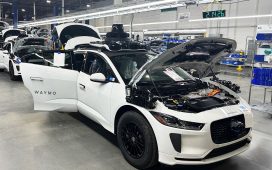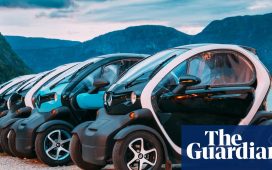Press play to listen to this article
Voiced by artificial intelligence.
BERLIN — Europe’s worst-kept secret is that the Germans ultimately decide everything.
“I’ll never forget how all the other member states held back in anticipation, waiting to see what the Germans would do,” a senior U.K. official, recalling his time in Brussels, recently told a private dinner of MPs and other German officials in Berlin.
The recollection was meant as a compliment, one the official hoped would ingratiate him with the Germans around the table.
Sad thing is it worked.
The second worst-kept secret in Brussels is that for all the “peace project” kumbaya, the Germans actually enjoy dominating the place. That said, even stalwart veterans of the EU bubble were hard-pressed in recent days to cite a more blatant example of toxic Germanity than Berlin’s last-minute intervention to save the internal combustion engine.
To recap: Last week, EU countries were expected to rubber-stamp a package of measures aimed at ridding Europe’s roads of fuel-burning autos. Under the plan, the EU would prohibit new registrations of cars powered by internal combustion engines beginning in 2035. The sweeping deal, the culmination of years of painstaking negotiations in Brussels and European capitals, is a pillar of the EU’s ambitious goal to become carbon neutral by 2050.
Berlin’s 11th-hour intervention on a deal everyone believed was done and dusted not only left the EU’s environmental policy in limbo, it also laid bare the bloc’s power vertical in all its dubious Teutonic glory. The message: Germany is no longer even trying to hide its power.
Enter France.
“For the French, the situation also represents an opportunity and they are never ones to waste a good crisis,” an EU diplomat said. “The more they can contribute to the idea that Germany goes it alone, the more it strengthens the view that the Germans are an unreliable partner in Europe.”
Germany’s unprecedented move has given rise to fears that other countries will try to follow its example and hold EU reforms hostage by threatening a last-minute veto to win concessions, in effect rewriting the rules of engagement.
Germans may not be known for their finesse, but even so, Berlin’s bare-knuckle tactics to save the engine have not just shocked Brussels veterans, it’s angered them.
That’s why the real significance of the standoff has less to do with CO2 emissions than how Brussels works. One big concern among EU insiders is that the coalition Germany has assembled to save the car, which includes the likes of Poland, Austria, the Czech Republic and Bulgaria, will go rogue as a bloc on other fronts, with or without German support.
It’s easy to mock the circuitous nature of EU decision-making, the push and pull between the European Commission, Parliament and Council, communicated in the opaque dialect of Brussels’ earnest eurocrats.
Boring as it may be, the alchemy produces bona fide results that legitimize and sustain the EU.
That Germany is willing to tinker with this delicate balance betrays either ignorance in the current regime of how the EU works, ambivalence, or both.
One could argue with justification that Germany was never going to kill the golden goose. Invented and perfected in Germany over more than a century by the likes of Mercedes, BMW and Audi, the internal combustion engine has been the wellspring of German pride and prosperity for generations.
The image of a piston-fired Porsche 911 zooming down the autobahn is as core to German identity as sex is to the French.
Take that away, what’s left (aside from beer and bratwurst)?
Indeed, considering that the country’s automakers haven’t proved particularly adept at manufacturing electric cars (or more specifically the batteries at the heart of the vehicles), there was a strong case for Germany to develop low-emission synthetic fuels that would keep the internal combustion engine alive.
Berlin had at least a decade to do so.
Thing is, it didn’t, choosing instead to pour billions into subsidizing the purchase of electric vehicles and the infrastructure to recharge them (full disclosure: the author is a beneficiary of such a subsidy).
What’s more, Germany also encouraged other European countries to follow suit. In fact, Berlin’s views on “the future of mobility” were so clear that Mercedes, VW and BMW pledged to shift to all-electric by 2035. The cluster of countries that have served as the workbench for those companies, from Slovakia to Hungary and Austria, all agreed to go along.
That’s why the German insistence this month that the EU carve out an exception to the engine ban for cars powered by synthetic, so-called e-fuels has caught the rest of Europe flat-footed.
Why now? In a word, politics.
Chancellor Olaf Scholz’s Social Democrats have dropped below 20 percent in a number of recent polls, putting them more than 10 percentage points behind the first-place Christian Democrats.
Scholz’s smallest coalition partner, the business-oriented Free Democrats (FDP), are in even worse shape. The party fared miserably in a string of recent regional elections and in national polls, it is teetering perilously close to the 5 percent threshold parties need to surpass for entry into parliament.
Party leader Christian Lindner, who used to drive souped-up Porsches around the storied Nürburgring race track, has vowed to save the engine from the clutches of the Green lobby.
Scholz, keenly aware that his party’s base also remains attached to “das Auto,” has been happy to let him try and has so far not stepped in to intervene.
About 1 million Germans work in the auto industry and many of those jobs — especially at suppliers — would be lost if the engine is killed for the simple reason that electric cars have far fewer (and different) parts than traditional automobiles.
The real mystery is why the Greens, the other party in Germany’s governing triumvirate, have not done more to resolve the crisis. Not only has the environmental party championed the engine ban for years, but it is also the most pro-European party in the government and would normally be at pains to keep Berlin from even appearing to undermine Brussels.
Yet Green Vice Chancellor Robert Habeck has largely been silent on the issue. Far from the fray in Europe, he was last spotted in the Amazon having his face painted by an indigenous girl during a swing through the region.
In a bid to defuse the standoff ahead of next week’s EU leaders’ summit, the German government sent a letter to the Commission on Wednesday, spelling out what it wants in return for lifting its blockade. Its chief demand — a broad exception for e-fuels — was already rejected by the Parliament and other institutions during the original negotiations over the package.
Reversing that would require the deal to be reopened.
The French are sure to cry foul.
And then Germany will push ahead anyway.
Joshua Posaner contributed reporting.









